Best Oracle Database Tools to Buy in February 2026
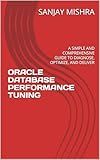
ORACLE DATABASE PERFORMANCE TUNING: A SIMPLE AND COMPREHENSIVE GUIDE TO DIAGNOSE, OPTIMIZE, AND DELIVER


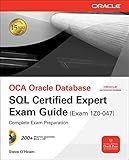
OCE Oracle Database SQL Certified Expert Exam Guide (Exam 1Z0-047) (Oracle Press)
- SAME-DAY DISPATCH FOR ORDERS BEFORE NOON-FAST DELIVERY!
- MINT CONDITION PRODUCTS ENSURE QUALITY AND SATISFACTION.
- HASSLE-FREE RETURNS-SHOP WITH CONFIDENCE!



Oracle Database 12c The Complete Reference (Oracle Press)
- AFFORDABLE PRICES ON QUALITY PRE-OWNED BOOKS FOR SAVVY SHOPPERS.
- ECO-FRIENDLY CHOICE: REDUCE WASTE WHILE ENJOYING GREAT READS!
- CAREFULLY INSPECTED FOR QUALITY, ENSURING A SATISFYING EXPERIENCE.


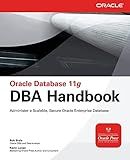
Oracle Database 11g DBA Handbook (Oracle Press)


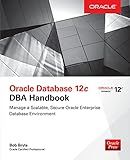
Oracle Database 12c DBA Handbook (Oracle Press)


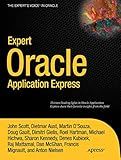
Expert Oracle Application Express
- QUALITY ASSURANCE: THOROUGHLY INSPECTED FOR GOOD CONDITION.
- COST-EFFECTIVE: AFFORDABLE PRICES FOR QUALITY USED BOOKS.
- ECO-FRIENDLY CHOICE: SUPPORTS RECYCLING AND SUSTAINABLE READING.


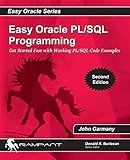
Easy Oracle PLSQL Programming: Get Started Fast with Working PL/SQL Code Examples (Easy Oracle Series)



Toad Pocket Reference for Oracle: Toad Tips and Tricks (Pocket Reference (O'Reilly))


To select data from Oracle using PHP, you will need to establish a connection to the Oracle database using the appropriate credentials. You can use the OCI8 extension in PHP to connect to Oracle databases.
Once you have successfully connected to the Oracle database, you can use SQL queries to retrieve data from the tables. You can use the oci_parse() function to prepare a SQL query, and then execute the query using the oci_execute() function.
After executing the query, you can fetch the results using the oci_fetch_array() function and iterate over the results to display or process the data as needed.
Remember to handle errors appropriately by checking for Oracle errors using the oci_error() function and closing the connection to the database when you are done using the oci_close() function.
How to iterate through the result set of a query fetching data from Oracle in PHP?
To iterate through the result set of a query fetching data from Oracle in PHP, you can use the OCI8 extension which provides functions for interacting with Oracle databases. Here is an example of how you can execute a query and iterate through the result set:
In this example, we first establish a connection to the Oracle database using the oci_connect function. We then define our query, parse it using oci_parse, and execute it using oci_execute. We then use a while loop and the oci_fetch_assoc function to fetch each row in the result set as an associative array, and then access the individual column values in each row.
Finally, we free the statement and close the connection using oci_free_statement and oci_close.
Remember to replace username, password, hostname, servicename, your_table, and column1 with your actual Oracle database credentials, table name, and column names.
How to determine if a PHP query is successful in fetching data from an Oracle database?
You can determine if a PHP query is successful in fetching data from an Oracle database by checking the result of the query. Here's how you can do it:
- Execute the query using the oci_parse() function to prepare the SQL query.
- Use the oci_execute() function to execute the query.
- Check the result of the oci_execute() function. If it returns true, the query was successful. If it returns false, there was an error in executing the query.
- If the query was successful, you can fetch the data using the oci_fetch_array() or oci_fetch_assoc() functions.
- You can also check the number of rows returned by the query using the oci_num_rows() function.
Here's an example of how to determine if a PHP query is successful in fetching data from an Oracle database:
// Connect to Oracle database $conn = oci_connect('username', 'password', 'localhost/orcl');
// Prepare SQL query $sql = 'SELECT * FROM employees'; $stmt = oci_parse($conn, $sql);
// Execute query $success = oci_execute($stmt);
if ($success) { // Query was successful // Fetch data while ($row = oci_fetch_assoc($stmt)) { // Process the data print_r($row); }
// Get number of rows
$numRows = oci\_num\_rows($stmt);
echo 'Number of rows: ' . $numRows;
} else { // Query failed $error = oci_error(); echo 'Query failed: ' . $error['message']; }
// Close connection oci_close($conn);
In this example, we check the result of the oci_execute() function to determine if the query was successful. If it is successful, we fetch the data using oci_fetch_assoc() and also check the number of rows using oci_num_rows(). If the query fails, we display the error message using oci_error().
What is the execution context for PHP scripts connecting to an Oracle database?
The execution context for PHP scripts connecting to an Oracle database typically includes:
- Connection parameters: This includes the database host, username, password, and database name that the PHP script will connect to.
- Database connection: The PHP script needs to establish a connection to the Oracle database using functions like oci_connect() or PDO.
- SQL queries: Once the connection is established, the PHP script can execute SQL queries against the database using functions like oci_parse() and oci_execute().
- Data retrieval and processing: The PHP script can fetch data from the database using functions like oci_fetch_assoc() or PDO::fetch() and process it accordingly.
- Error handling: It's important to handle any errors that may occur during the database connection or query execution, using functions like oci_error() or PDO::errorInfo().
Overall, the execution context for PHP scripts connecting to an Oracle database involves establishing a connection, executing SQL queries, retrieving and processing data, and handling any errors that may occur.
What is the importance of using placeholders in Oracle queries executed through PHP?
Placeholders in Oracle queries executed through PHP are important for several reasons:
- Security: Placeholders help prevent SQL injection attacks, where an attacker can manipulate input to execute malicious SQL commands. By using placeholders, input data is treated as data rather than as part of the SQL query itself, reducing the risk of SQL injection.
- Performance: Placeholders can help improve query performance by allowing Oracle to cache query execution plans. When a query with a placeholder is prepared, Oracle creates an execution plan that is reused for subsequent executions of the same query with different parameter values, reducing the overhead of query planning and optimization.
- Readability and maintainability: Using placeholders can make queries more readable and easier to maintain by separating the SQL query from the input data. This can make it easier to understand and modify queries, especially for complex queries with multiple parameters.
Overall, using placeholders in Oracle queries executed through PHP can help improve security, performance, and maintainability of the code.
